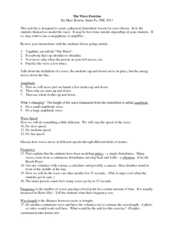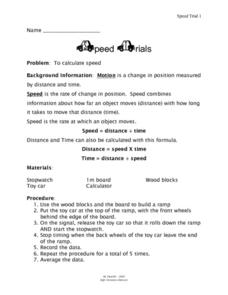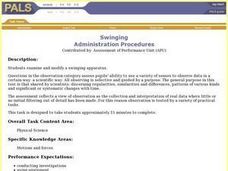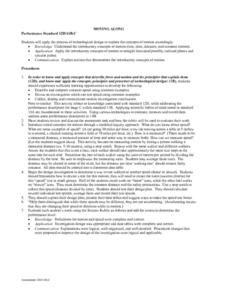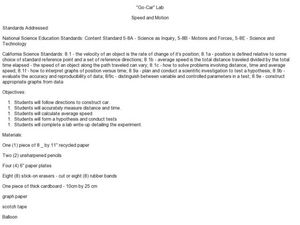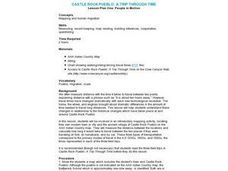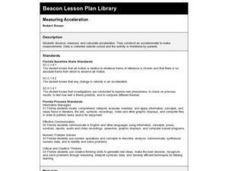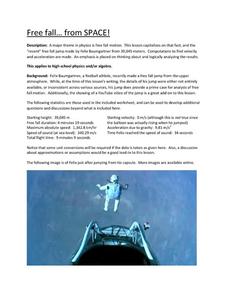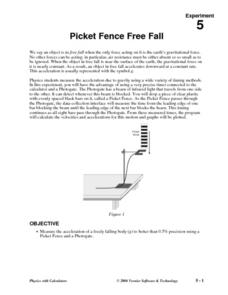National Science Teachers Association
Paper Car Crash Design
High school physical scientists collide with motion. They work in pairs to design a paper car that will protect a raw egg during a head-on collision. Measurements of distance traveled, time of run, vehicle specs, and photo gate flags are...
University of California
Hot! Hot! Hot!
Calories are not tiny creatures that sew your clothes tighter every night, but what are they? A science lesson, presented at multiple levels, has learners experiment with heat, heat transfer, and graph the function over time....
The Science Spot
The Wave Exercise
During a lesson plan on wave motion, physical science participants basically act out the waves as a group. Through their movements, the amplitude, speed, frequency, and wavelength are all identified. Ideas for modeling the reflection and...
Curated OER
Numerical Determination of Drag Coefficients
Young scholars create a video of an object falling with a drag. For this physics lesson, students calculate drag coefficient using data from Logger Pro. They calculate velocity and acceleration of the object.
Curated OER
Speed Trails
In this Algebra I/Algebra II worksheet, students conduct an experiment with toy cars in order to calculate and compare average, instantaneous, and constant speed. The two page worksheet contains three questions. Answers are...
Curated OER
Domino Dash
Eighth graders examine the relationship between speed, time and distance. In this motion lesson students complete a lab activity that allows them to calculate average speed.
Curated OER
Swinging Observations
Students build a pendulum type swinging apparatus and make specific and selective observations using what they know about scientific observations. They look for regularities of movement, patterns, and systemic changes over time.
Curated OER
2D Kinematics w/ String Racers
Students calculate the speed of string racers. In this physics lesson, students measure the time in several trials and get the average. They graph their results using a spreadsheet.
Curated OER
Moving Along
Students are introduced to the concept of motion. In groups, they practice calculating the rate, time, and distance of various objects on a variety of surfaces. To end the lesson, they apply the same principles to those objects moving...
Curated OER
Atlatl Lessons Grades 4-12
Young scholars examine motion and how to describe it qualitatively. In this investigative lesson students see how aboriginal people were environmentally responsible.
Curated OER
"Go-Car" Lab
Students construct a car based on directions given. In this physics instructional activity, students calculate average speed using distance and time information. They collect data and create a graph of distance vs. time.
Curated OER
Amusement Park Physics
Students get up close and personal with principles of motion. In this physics lesson, students collect and analyze acceleration data on amusement park rides. Students use CBLs to collect data in this lesson.
Curated OER
Activity One Teacher Page: Vehicles In Motion
Students identify variables that affect the system, and specify which variables are independent and which are dependent.
Curated OER
CASTLE ROCK PUEBLO: A TRIP THROUGH TIME
Learners use a map to respond to a series of questions. They determine how much time it would take to travel to Castle Rock Pueblo from different pueblos and locate modern pueblos on the Indian Country map.
Curated OER
Newton's Laws
Students give examples of each of Newton's three laws as they occur in everyday experiences. They visually represent and differentiate the difference between a direct proportion and an inverse proportion. Students explain how the...
Curated OER
Measuring Acceleration
High schoolers create an accelerometer and take measurements of acceleration in a moving car. They study the car speeding up in a straight line, slowing in a straight line and curving at constant speed. They prepare a lab report showing...
Curated OER
Was Kepler Correct?
Students are introduced to Kepler's 2nd law of Planetary Motion. The lesson reinforces the understanding of focal points. They calculate the sector area of an ellipse.Students expand understanding by modeling Kepler's 2nd Law of...
University of Wyoming
Free Fall…From SPACE!/Nanotechnology in the Classroom
Provide the details about Felix Baumgartner's sky jump from the far reaches of our atmosphere, 39,045 meters up! Then get your physics free fallers to evaluate the factors that played a role in his acceleration, the time to reach maximum...
Curated OER
Newtonian Mechanics
Students familiarize themselves, through teacher demonstration, with Gavendish's apparatus first used for experimentally determining the value of the Universal Gravitational Constant G, and calculate theoretical value of Earth's...
Curated OER
Stick-Slip Movement
Ninth graders operate a model to observe the type of motion that occurs at a fault during an earthquake. They explore the effects of several variables. Students measure movement, calculate averages and plot and graph information.
Curated OER
The Electric Hookup
Students determine the wattage of appliances found in the home. They identify ways to conserve energy and calculate the number of kilowatt-hours that appliances use. They also discover the costs per kilowatt-hour for the appliances.
Curated OER
It's Going to Blow Up!
Get your ocean explorers online, reading articles about submarine volcanoes. They answer a series of questions and take a geometery challenge in which they calculate how much of a volcano has been blown away. Make sure to explore several...
Curated OER
Picket Fence Free Fall
Students measure acceleration using a Picket Fence and a Photogate. In this physics lesson, students drop an object and measure the acceleration of the object free falling. They log their data using the TI.
Curated OER
A Classical & Relativistic Trip to a Black Hole
Learners calculate distance, velocity, acceleration and time on their fantasy trip to the black hold. They apply Newton's Laws of Motion and calculate circular motion. They discuss any questions that may arise.


